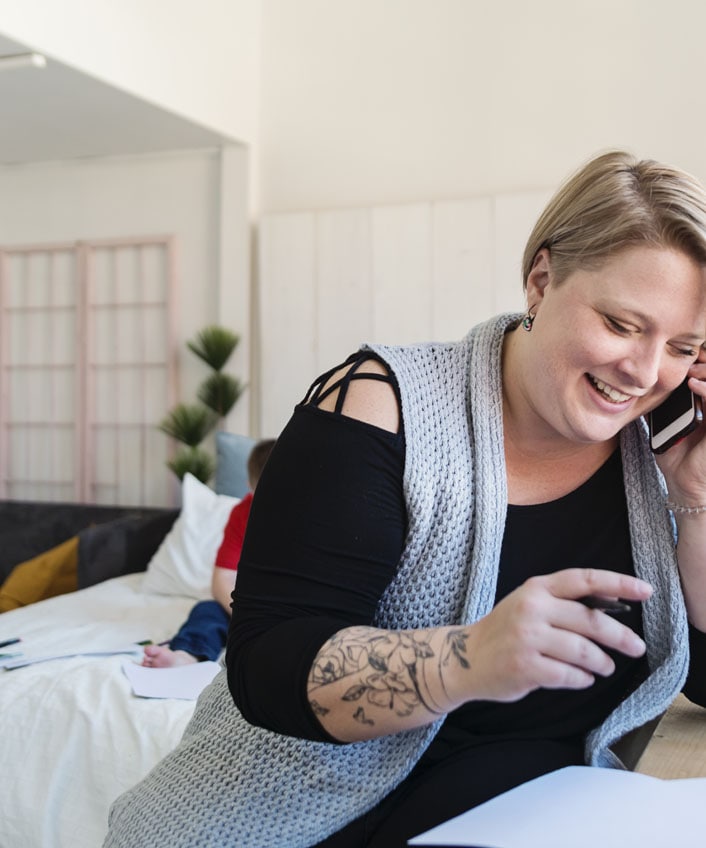Digital Detox: Take control of your smartphone
Do you feel like you’re spending too much time on front of digital devices? Then a digital detox might be exactly what you need.

Did you know: A global survey conducted by The Harris Poll on behalf of NortonLifeLock discovered that on average, adults in the UK report spending 5.5 hours a day in front of screens outside of work or school, and for many, it’s too much. Overall, three in five (61%, including 73% of 18-39 year olds) admit they spend way too much time looking at screens.1
The thing is: It’s completely relatable. With COVID-19, “always on” is now more prevalent than ever before. Working from home and contact restrictions have made it much more important to stay online and to take your smartphone everywhere. After all, it’s the Swiss army knife of communication: It’s small, light, and portable and offers a calendar, alarm clock, video chat functionality, different messengers, social media apps, and more.
Thanks to its ease of use and importance, a lot of people also tend to develop bad habits: Sleeping with a smartphone next to one’s bedside and checking emails, Facebook, Instagram and / or TikTok as soon as one wakes up for example isn’t all that healthy. That’s where a digital detox can help.
What is a digital detox?
The “digital detox” trend originated in the US. It refers to a period of time during which one refrains from using electronic devices that are connected to the internet. That of course includes smartphones, tablets and computers, and probably some smart devices. It should help with reducing stress, forming healthy habits and2 preventing an addiction to being online.
What sounds easy in theory is not all that simple to implement: While a lot of people love the idea of spending some time offline, a digital detox seems to be harder to follow through with than it sounds: In a study conducted by Bitkom only around 50% of the participants who wanted to go through with a detox managed to finish it.
Helpful guidelines to detox your digital activities and more importantly: yourself
So, what’s the best way to actually approach a digital detox? Radically locking away your smartphone – for example when on holiday – might not be too helpful. On the one hand, it doesn’t form new and healthy habits, and on the other hand, a lot of people would miss the ability to take holiday snaps with their phones. Luckily there are a couple of tricks that can assist you in your endeavour:
1) Planning and preparation
In order to change your habits and form new ones, you should consider in advance what your daily life could look like. Ask yourself the following questions:
- How can I make sure to still stay in contact with enough of my friends?
- How much online time do I actually need to feel happy?
- What are the advantages I see in a digital detox?
- What do I actually plan on doing with my time instead of spending it in front of a screen?
The last question is especially important: if you don’t have a plan, you will probably just grab your smartphone or tablet again to pass the time. Make sure you consider each of the above questions and find answers that sound reasonable and achievable to you. This will help you to do something meaningful in your newfound time and also prevent you from feeling lonely.
2) No smartphone usage after 7pm
Well – it doesn’t have to be 7pm, but let’s be honest: A smartphone is always a temptation when it’s near us. “Was my boss happy with the results I mailed him or her?”, “How many likes did my latest Facebook post get?” – these are just some of the reasons why you would normally pick up your phone – just for a quick check, mind you. But normally one thing leads to another and soon you’ve spent another hour or more in front of your screen.
The easiest solution is to decide on a time where you can just turn your devices off and put them away. This can be in the evening or in the morning, whatever suits you best. Consider storing them out of sight – this will lessen the temptation to just turn them on again.
3) Ban your devices from the dining table …
… or other locations in your home. This can be your bedroom (there are studies that indicate that smartphones impact sleep) or the dining table – especially if you are not living alone. This will not only help in your digital detox but also result in a better quality of life for you and your loved ones.
4) Celebrate mobile-free weekends
Switch off your mobile devices for a Saturday, a Sunday or even for a whole weekend! You’ll be surprised how much time you’ll have for other things.
5) Use alternative means
As mentioned above, smartphones are very useful. But let’s be honest – we managed to do most if not all of the things we do now even before there were mobiles. So how about you try the following:
- Use a real alarm clock instead of your smartphone.
- If you need to look something up, why not use a real dictionary instead of an online one?
- Do you still have some maps lying around? Use them instead of Google Maps.
6) Check out and download a digital detox app
It might sound a bit counterproductive to tell you to grab your smartphone and look for an app – but there are a lot of good ones out there that will help you to make your digital detox a success. Some even have cool challenges build in! Take a look at what they offer and how to set them up so that you can find the one that fits you best.
Notes
These new findings serve as a second addendum to the 2021 Norton Cyber Safety Insights Report (NCSIR) examining the impact of cybercrime, in addition to the 2021 Norton Cyber Safety Insights Report: Special Release – Online Creeping uncovering consumers’ online creeping behaviours. Conducted in partnership with The Harris Poll, the 2021 Norton Cyber Safety Insights Report: Special Release – Home & Family surveyed more than 8,000 adults aged 18+ across eight countries to assess consumers’ at-home online behaviours.
To view the study’s full results and accompanying visual assets, please visit the 2021 Norton Cyber Safety Insights Report: Special Release – Home & Family press kit at: https://www.nortonlifelock.com/about/newsroom
1 Based on an online survey of 1,004 UK adults. Conducted by The Harris Poll on behalf of Norton™ LifeLock™, between May 20 through June 8, 2021.
Editorial note: Our articles provide educational information for you. Our offerings may not cover or protect against every type of crime, fraud, or threat we write about. Our goal is to increase awareness about Cyber Safety. Please review complete Terms during enrollment or setup. Remember that no one can prevent all identity theft or cybercrime, and that LifeLock does not monitor all transactions at all businesses. The Norton and LifeLock brands are part of Gen Digital Inc.




Want more?
Follow us for all the latest news, tips and updates.